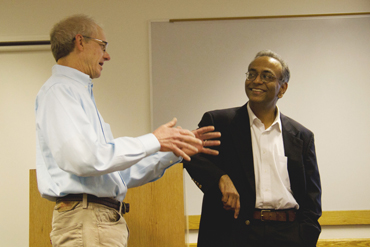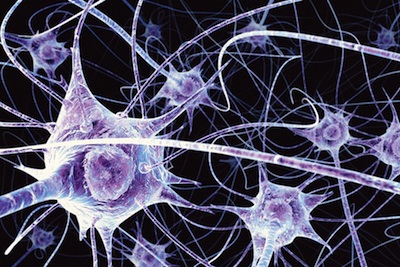Humanities at Stanford
Inside the humanities at Stanford University
Stanford philosophers say tools from science can help answer questions about the human condition
Philosophers take an interdisciplinary approach to understanding self-awareness in a Stanford Humanities Center workshop.
BY VERONICA MARIAN
 Neuroscience can explain which parts of the brain are activated when someone hears a song, but why the song triggers a specific memory in the listener remains a mystery. So does the fact that we can be aware of various mental states we experience without knowing anything about how the brain actually works. Now, two Stanford philosophers have created a workshop where humanists and scientists are sharing their latest research on conscious experience in the hopes of coming closer to answering such philosophical and physiological questions.
Neuroscience can explain which parts of the brain are activated when someone hears a song, but why the song triggers a specific memory in the listener remains a mystery. So does the fact that we can be aware of various mental states we experience without knowing anything about how the brain actually works. Now, two Stanford philosophers have created a workshop where humanists and scientists are sharing their latest research on conscious experience in the hopes of coming closer to answering such philosophical and physiological questions.
Sponsored by the Stanford Humanities Center, the “Interdisciplinary Approaches to Consciousness” workshop was created by John Perry, the Henry Waldgrave Stuart Professor of Philosophy, Emeritus, and Paul Skokowski, consulting professor in Symbolic Systems and Philosophy. Their goals, says Perry, are to introduce participants to new ideas and academic findings and to foster collaborative research efforts across disciplines like philosophy, literature and various sciences.
“People in the humanities want to understand the philosophical basis of the things they research,” says Michaela Hulstyn, a PhD candidate in French and the workshop’s student coordinator. For someone who studies the philosophical aspect of how we think, having a conversation with a neurologist who understands the biological workings of the brain can be illuminating, she explains. These interactions, she says, “can be invaluable to both, since they could lead to innovative perspectives for each field.”
Perry and Skokowski believe that consciousness, or awareness of one’s self and thoughts, can be better understood through a multi-faceted lens. “No one field on its own has provided a satisfactory answer to the nature of consciousness,” said Skokowski, who co-directs the Center for the Explanation of Consciousness (CEC) along with Perry.
Now in its second year, the workshop has brought together experts from institutions around the world in fields as varied as literature, psychology, psychiatry and law to engage Stanford scholars in dialogue about various aspects of consciousness. So far, the 18 workshop meetings have covered such topics as the ethical implications of shooting zombies, personal color preferences and the feeling of pain – all aspects of conscious experience.
The workshop, supported by a gift from Claire and John Radway, evolved from talks by Perry and Skokowski at the Center for Explanation of Consciousness (CEC), part of Stanford’s Center for the Study of Language and Information (CSLI). They decided to broaden the scope of the talks by inviting experts from various fields to speak on topics related to philosophical questions. The workshop “has helped us achieve the goal of bringing together amazing intellectual breadth,” says Skokowski.
The workshop is one of 16 currently sponsored by the Stanford Humanities Center through the Theodore and Frances Geballe Research Workshop Program, which is now accepting applications for the 2013-2014 series.
Fostering the nexus between philosophy and neuroscience
 The history of trying to explain how thoughts form and manifest dates back to Aristotle, if not earlier. Perry points out that “our concepts for describing mental events and processes evolved when we were quite ignorant of the inner workings of the brain.” Today, many of the brain’s mysteries are being revealed through science, and Perry, who co-hosts the nationally syndicated radio program “Philosophy Talk,” believes we must relate this new information to the age-old ways of dealing with the mind.
The history of trying to explain how thoughts form and manifest dates back to Aristotle, if not earlier. Perry points out that “our concepts for describing mental events and processes evolved when we were quite ignorant of the inner workings of the brain.” Today, many of the brain’s mysteries are being revealed through science, and Perry, who co-hosts the nationally syndicated radio program “Philosophy Talk,” believes we must relate this new information to the age-old ways of dealing with the mind.
Skokowski agrees, adding that tools like fMRI machines measuring brain activity can offer insights into “one of the truly difficult problems in nature, defining conscious experience.” A deeper knowledge of how the brain works, he says, would help philosophers understand the brain’s interaction with the surrounding environment in order to explain conscious experience.
As an Empiricist who believed all knowledge was based on experience, John Locke argued that a blind person, upon gaining sight, would be unable to distinguish between a sphere and a cube. His claim has been debated by philosophers for 300 hundred years, and now, Skokowski says, “advances in medicine and surgery that explain brain plasticity and how we learn can finally answer this long-standing philosophical debate.”
This explains why a neuroscientist who specializes in eye surgery led the most recent workshop event, “Learning to See Late in Life.” Dr. Pawan Sinha, Professor of Vision and Computational Neurosciences at MIT, presented the findings of “Project Prakash,” an initiative he leads documenting the experiences of blind children in India who gain their sight post-surgery.
Dr. Sinha’s research proved Locke’s theory to be – mostly – correct. Immediately after gaining sight, children failed to visually recognize objects they could identify by touch, but within days, they could point out the same objects, proving the brain learns quickly how to form a connection between tactile and visual experience. Perry says Locke’s argument was purely theoretical since he “was pretty clueless” about neural structures needed for sight. Research like Sinha’s is an example of how new scientific discoveries can confirm or refute beliefs that for centuries have been grounded in the philosophical, theoretical realm.
What is consciousness?
So, what is consciousness and why should various disciplines study it?
There are two aspects of what we call “consciousness,” says Perry. We have experiences, and it’s “like something” to have them – the experience of tasting a fine merlot is different from tasting a fine chocolate chip cookie, and even more different from the experience of chewing rancid tofu, he explains. But we also have self-awareness. “We not only have experiences, but we are conscious of having them, and we plan our lives around which ones we want to have and which ones we want to avoid. And we are aware of ourselves, as one self among others; that is, we are self-conscious,” he explains.
It is important to explore this concept of self-awareness, or consciousness, because it “connects with the deepest issues about human existence,” says Hulstyn. Long before brain-science, issues of self-awareness and how experiences shape our consciousness were pondered by philosophers, novelists and humanists.
Philosophy has long been the realm where seemingly unanswerable questions about the human condition have been debated. For a philosopher, says Perry, “it’s perhaps a bit disappointing” to think science can now answer questions previously only philosophers could think about – however inadequately. “But new scientific research can give philosophers a lot more to think about, and the tools to think about them.”
